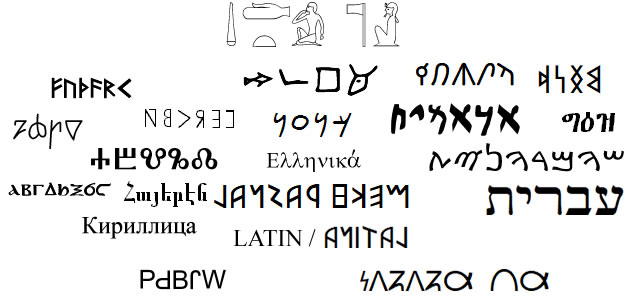Many scripts are known to have or thought to have developed from other scripts, and they can be grouped into families that share common ancestors. Here are the writings systems on Omniglot arranged in their script families

Writing systems: Abjads | Alphabets | Abugidas | Syllabaries | Semanto-phonetic scripts | Undeciphered scripts | Alternative scripts | Constructed scripts | Fictional scripts | Magical scripts | Index (A-Z) | Index (by direction) | Index (by language) | Index (by continent) | What is writing? | Types of writing system | Differences between writing and speech | Language and Writing Statistics | Languages
Sumerian Cuneiform was invented in southern Mesopotamia (modern Iraq) in about 3,500 BC. It was the oldest known writing system that has been deciphered. It was adapated to write other languages of Mesopotamia and nearby places, and other scripts were modelled on it.
More information about Cuneiform
https://en.wikipedia.org/wiki/Cuneiform
[top]
Hieroglyphic writing first appeared in ancient Egypt in about 3,200 BC and was used until the 4th century AD. The Hieratic script, a cursive version of the Hieroglyphic script, developed about the same time, and an even more cursive script, Demotic, appeared in about 650 BC. The Proto-Sinaitic script was modelled on the Hieroglyphic and Hieratic scripts, and many other scripts developed from or were based on it.
[top]
Chinese scripts developed from the Chinese Oracle Bone script, which dates from about 1,250 BC, or were modelled on descendents of that script. Much older writing has been found in China, however it has not been deciphered and it is not known if it is related to the later scripts.
More information about Chinese scripts
https://en.wikipedia.org/wiki/Chinese_family_of_scripts
[top]
These scripts developed in Mesoamerica and date back to at least 900 BC, and possibly much earlier. It is not known if they developed from each other, or were modelled on each other.
More information about Mesoamerican writing systems
https://en.wikipedia.org/wiki/Mesoamerican_writing_systems
[top]
The origins of the writing systems in this section are not known or are uncertain.
[top]
These scripts were invented to write particular languages. They may be based on or inspired by other writing systems
Writing systems: Abjads | Alphabets | Abugidas | Syllabaries | Semanto-phonetic scripts | Undeciphered scripts | Alternative scripts | Constructed scripts | Fictional scripts | Magical scripts | Index (A-Z) | Index (by direction) | Index (by language) | Index (by continent) | What is writing? | Types of writing system | Differences between writing and speech | Language and Writing Statistics | Languages
[top]
You can support this site by Buying Me A Coffee, and if you like what you see on this page, you can use the buttons below to share it with people you know.

If you like this site and find it useful, you can support it by making a donation via PayPal or Patreon, or by contributing in other ways. Omniglot is how I make my living.
Note: all links on this site to Amazon.com, Amazon.co.uk
and Amazon.fr
are affiliate links. This means I earn a commission if you click on any of them and buy something. So by clicking on these links you can help to support this site.
[top]